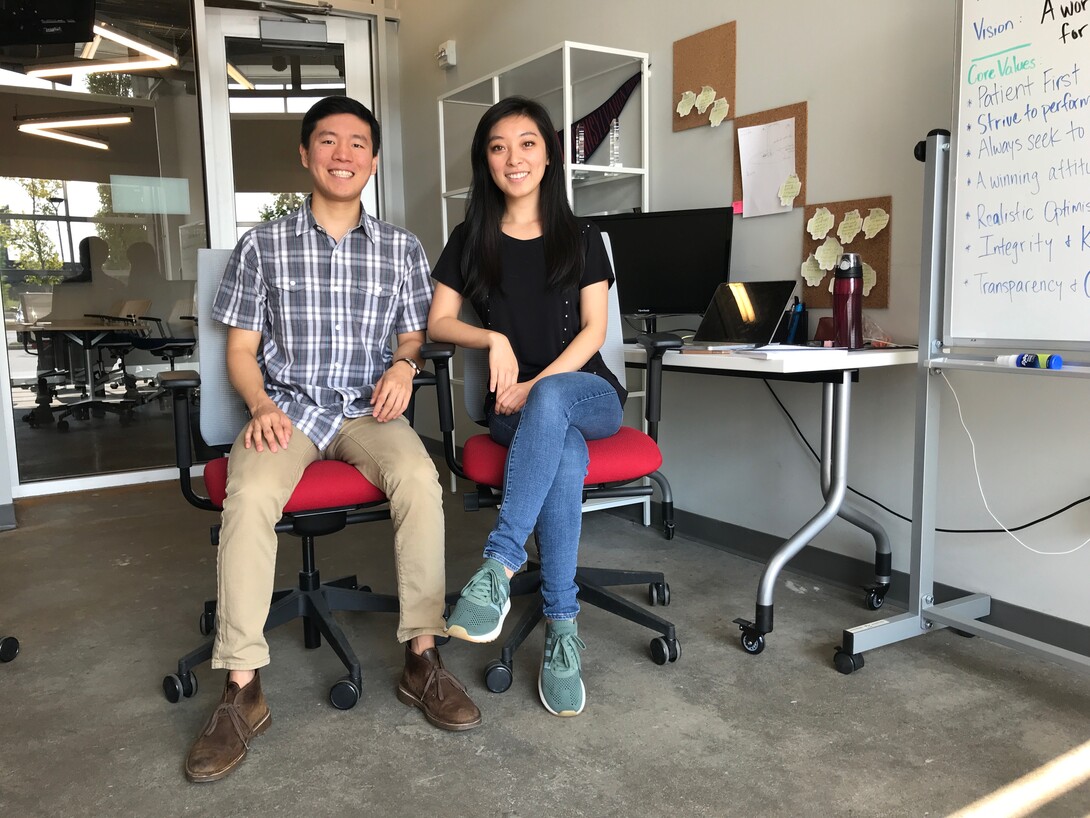Recipients of the 2018 University of Pennsylvania President’s Innovation Prize leverage support to commercialize a novel nanotechnology -- and treat glaucoma and cure blindness.
Media Contact: Jennifer Rizzi, Director, Communications, Penn Facilities & Real Estate Services, 215.573.6107, rizzi@upenn.edu
September 5, 2018
The University of Pennsylvania’s Division of Facilities and Real Estate Services announced today that this year’s President’s Innovation Prize (PIP) winners have joined the host of researchers and entrepreneurs pushing the envelope in science, business, and technology at the Pennovation Center. The competition, which highlights Penn’s commitment to innovation, grants graduating seniors the resources needed to translate revolutionary ideas into commercial ventures with a positive and potentially global impact. Brandon Kao (of Penn’s School of Engineering and Applied Science) and Rui Jing Jiang and Adarsh Battu (of the Wharton Business School) were selected for their progress in developing a defense against glaucoma and tackling blindness with nanotechnology. The three have since launched Avisi Technologies (Avisi), a pre-clinical medical devices startup that will go to work from a dedicated startup garage and lab bench within the Pennovation Center.
With their new accommodations and access to continued mentorship from the Penn Center for Innovation, Kao and Jiang will advance the development of VisiPlate, a nanoscale ocular implant designed to treat the second leading cause of blindness in the world: open-angle glaucoma. By 2020, this type of glaucoma will affect 3.4 million people in the United States. Across the globe, that number will balloon to a total of 80 million. Open-angle glaucoma is a disease that arises from clogged drainage canals in the eye, which lead to heightened internal eye pressure and result in damage to the optic nerve – and ultimately, vision loss that cannot be cured or reversed.
Avisi’s miniscule aqueous shunt is a whopping 10,000 times thinner than alternative mid-to-late stage, last-line-of-defense implants. For context, that’s less than one percent of the thickness of a standard contact lens. The shunt is made of alumina, a long-lasting implant material commonly used in hip replacements, and allows VisiPlate to own the dual advantage of being both ultrathin and incredibly durable. Because of its small size, surgeons can precision-place the implant under the surface in the front of the eye, where it can divert excess ocular fluid with minimal discomfort. And since the insertion procedure reduces time under the knife and eases the burden of follow-up care, doctors are better equipped to shorten operating times and enhance patient experience. Next steps for Avisi include continuing to build prototypes, conducting further preclinical tests, and receiving FDA approval so that they can take their device to market.
For the team behind the novel nanotechnology, there is no better place to set up shop and build on their history of interdisciplinary collaboration than at the Pennovation Center. The University’s innovation hub is a nucleus for the collision of bright minds and big ideas – an intersection that has not gone unnoticed by Kao, Jiang, and Battu. The close-knit award winners noted, “The Pennovation Center is a beautiful, well-run space full of diverse, groundbreaking companies and brilliant people. It has been inspiring to get to work here and we look forward to the rest of the year.” Avisi has been supported by grants and awards from the University of Pennsylvania, Wharton, The School of Engineering and Applied Science, Venture Initiation Program Accelerator (VIP-X), Penn Law’s Entrepreneurship Legal Clinic, VentureWell E-Teams, the Penn Center for Innovation NSF I-Corps Program, and Ballard Spahr BASE.
“Researchers and entrepreneurs joining the Pennovation Center are pushing the boundaries of what is possible across a range of disciplines and industries,” says Anne Papageorge, Vice President, Facilities & Real Estate Services at Penn. “We continue to strive to partner with industry to commercialize research more efficiently, grow our region’s innovation economy, and bring about positive change. Supporting startups like Avisi could not be more in line with our mission, and we look forward to helping this year’s PIP recipients advance their research and development and realize their goals of restoring health and promoting vitality on a global scale.”
About The Pennovation Center
The Pennovation Center is a 58,000 square-foot three-story facility designed for start-up companies, entrepreneurs, and inventors looking to be part of a unique community of innovators, and includes a full service technology incubator; basic wet and dry laboratories; private offices, Inventor Garages, as well as a coworking space for up to 200 members, operated by 1776. It opened in October 2016 as the centerpiece of the University of Pennsylvania’s Pennovation Works, a 23-acre development adjacent to the University campus on the southern bank of the Schuylkill River providing facilities and amenities to bridge intellectual and entrepreneurial initiatives among University researchers, private sector innovators, and start-ups. Owned by the University, and operated by its Division of Facilities and Real Estate Services, Pennovation Works houses research labs from Penn’s schools of Arts & Sciences, Dental Medicine, Design, Engineering & Applied Science, and Veterinary Medicine, and companies such as Qualcomm Philadelphia Research Lab, Netronix, and Limelight Bio. Approximately 85 companies and 350 innovators are currently located at Pennovation, where ideas go to work.
Visit pennovation.upenn.edu and follow @PennovationCenter on Facebook, @Pennovation on Twitter, and @PennovationCtr on Instagram.
Learn more about the company at www.avisitech.com.
